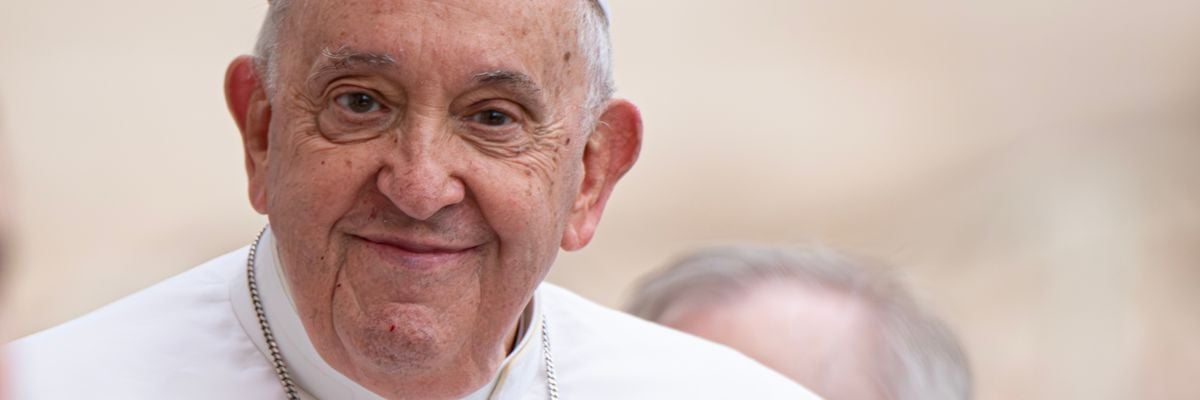
The death of Pope Francis at eighty-eight years old marks the end of a twelve-year pontificate that reflected the world’s social and cultural shifts in ways the Vatican had not previously seen.
A Jesuit from Argentina, Francis focused on social justice, alleviating poverty, and environmental stewardship, arguably with more emphasis than his immediate predecessors. But what will we remember from his legacy? Likely his exhortation to the Church to examine and embrace new ways of thinking, but also an increase of tensions among various camps in the Church.
From Bergoglio to Francis
Jorge Mario Bergoglio was born to Italian immigrant parents. His father was a railway worker, his mother a housewife. The family lived in a modest neighborhood in Buenos Aires, where his upbringing was shaped by his working-class environment and his Catholic faith. His devout family instilled in him a deep sense of faith from a young age, and he attended the Colegio de la Inmaculada, a Jesuit high school.
Young Jorge initially considered pursuing medicine or writing. However, at the age of twenty-one, he joined the Society of Jesus—a turning point in his life, setting him on a path that would eventually lead to the papacy.
In 1992, Bergoglio was ordained an auxiliary bishop of Buenos Aires, and in 1998 he became the archbishop there. As archbishop, he became known for his special advocacy for the poor and the disenfranchised.
In 2001, Pope John Paul II created Bergoglio a cardinal. He remained cardinal-archbishop of Buenos Aires until his election to the papacy in 2013, following the resignation of Pope Benedict XVI. In a break with tradition, he was the first to take the regnal name Francis, after St. Francis of Assisi.
From the outset, Francis brought to Rome a pastoral focus on the “peripheries.” He championed the poor, the marginalized, and the excluded, calling for greater inclusivity and compassion from the faithful. His vision of the Church as a “field hospital,” a place of healing and comfort for wounded sinners, brought him attention and admiration even from many non-Catholics. He critiqued the “globalization of indifference” and the “throwaway culture” that he saw as plagues on the modern world, and his words resonated. His words also had a strong effect on secular media and Vatican watchers, who often emphasized this shift (as they saw it) in the Church’s messaging and began openly speculating about bigger changes in Catholic doctrine, morals, and practice.
In the midst of such speculation, Francis’s writings and especially his off-the-cuff public statements sometimes left readers and listeners confused about their implications for the traditional teachings of the Church. Was the pope really changing, or planning to change, immutable Catholic teaching on issues like divorce, same-sex unions, and capital punishment? Was it within his power to change such things? These debates often roiled the laity, even as Francis issued laudable and moving calls for compassion, engagement, and spiritual renewal in the Church. Some Catholics worried that certain of Francis’s exhortations, however well-intentioned, delivered to the faithful more confusion than clarity.
Pope Francis’s Most Memorable Writings
His outreach to Catholics separated from their spouses and living conjugally with others, for example, turned out to be one of the most contentious issues of his pontificate. In 2016, the apostolic exhortation Amoris Laetitia sparked widespread debate, particularly regarding its language on the possibility of Communion for these Catholics, without the prerequisite that they change their situation (cf. Familiaris Consortio 84). Critics argued that the document could be implemented in a way that would contradict the Church’s longstanding teachings on marriage and the family; supporters saw it as a sensitive response to the complexities of modern life. This controversy surrounding Amoris Laetitia encapsulated the tension between Francis’s desire for pastoral inclusivity and the Church’s commitment to orthodox teaching and practice.
Concern for the environment also took center stage during Francis’s pontificate, particularly with the release of his encyclical Laudato Si’ in 2015. Here Francis called for urgent action to protect the earth, which he called “our common home.” Many praised his efforts to bring attention to environmental degradation and to remind mankind of our God-given rights and responsibilities regarding the land the Lord gave us.
Yet here, too, there was controversy, with some critics arguing that the document’s references to climate change theories and specifics of government policy blurred the line between religious leadership and political advocacy, overshadowing the document’s more fundamental moral and spiritual teachings.
In other areas, Francis spoke out unambiguously from the heart of traditional Catholic morals—for example, against the worst of the modern world’s excesses on sexuality. Regarding abortion, he said, “Every child who, rather than being born, is condemned unjustly to being aborted bears the face of Jesus Christ, who, even before he was born . . . experienced the world’s rejection.” Some years before he was elected pope, he urged his listeners to “defend the unborn against abortion even if they persecute you, calumniate you, set traps for you, take you to court, or kill you.” And he memorably compared abortion to hiring a “hit man to solve a problem.”
Changes in the Church?
Ultimately, the legacy of Pope Francis will be one of profound change—a pontificate that challenged many Catholics’ approach to social issues, to the poor and marginalized communities, to the environment, and to how we relate to non-Catholics and unbelievers. The Church now faces the task of fitting Francis’s legacy into a hermeneutic that includes two millennia of unchanging Catholic dogma.
As we prepare for that task, and as we pray for the eternal rest of Pope Francis’s soul, we can draw comfort from the words of Our Lord, whom Francis served as his vicar: “I am with you always, to the close of the age.”



